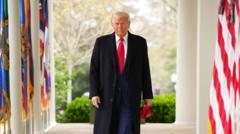With the looming implementation of President Trump’s new tariffs, the global economic landscape is fraught with uncertainty. Nations scramble to respond, with some seeking to negotiate while others adopt a stance of retaliation. Concerns grow about the potential destabilization of the world economy amid conflicting strategies and signals from the U.S. administration.
Uncertainty Reigns as Trump’s Tariff Strategy Sparks Global Trade Tensions

Uncertainty Reigns as Trump’s Tariff Strategy Sparks Global Trade Tensions
As the deadline for new tariffs approaches, President Trump's aggressive trade tactics leave nations in a precarious position, unsure of the future impacts on the economy.
In the face of impending tariffs set by President Trump, global leaders are caught in a precarious game of negotiation and retaliation. The U.S. president is poised to implement "reciprocal" tariffs that could reshape international trade relationships, forcing nations labeled as "worst offenders" to seek favorable outcomes before a potential economic fallout occurs.
While allies scramble to appease the administration, such as Israeli Prime Minister Benjamin Netanyahu, who pledged to reduce trade barriers, adversaries like China have adopted a more combative stance. The Chinese government has already announced counter-tariffs in response to Trump's planned increases, indicating a shift towards a tit-for-tat strategy.
Trump's refusal to clarify his stance even as financial markets react negatively has raised alarm among business leaders and investors alike. The president’s dismissive response to concerns about market deterioration suggests a determination to press forward without hesitation, prompting further speculation as to whether this is a mere negotiation tactic or part of a grand design to restructure global trade.
The chaos has created a ripple effect, leading to wild swings in stock market performance as investors grapple with the ramifications of the proposed tariffs. Confounding the situation is the contradictory messaging from the White House regarding the purpose and duration of the tariffs, leaving both financial markets and foreign leaders in a state of confusion.
Furthermore, speculation around a possible strategy known as the "Mar-a-Lago accord" hints at a deeper plan behind Trump’s actions, aimed at weakening the U.S. dollar to boost exports—a move considered risky by many economists. With no signs of retreat from the upcoming tariff deadline, the world watches closely as Trump embarks on this high-stakes endeavor, leaving nations wondering how far the U.S. will go to achieve its trade objectives and what the long-term implications will be for the global economy.
While allies scramble to appease the administration, such as Israeli Prime Minister Benjamin Netanyahu, who pledged to reduce trade barriers, adversaries like China have adopted a more combative stance. The Chinese government has already announced counter-tariffs in response to Trump's planned increases, indicating a shift towards a tit-for-tat strategy.
Trump's refusal to clarify his stance even as financial markets react negatively has raised alarm among business leaders and investors alike. The president’s dismissive response to concerns about market deterioration suggests a determination to press forward without hesitation, prompting further speculation as to whether this is a mere negotiation tactic or part of a grand design to restructure global trade.
The chaos has created a ripple effect, leading to wild swings in stock market performance as investors grapple with the ramifications of the proposed tariffs. Confounding the situation is the contradictory messaging from the White House regarding the purpose and duration of the tariffs, leaving both financial markets and foreign leaders in a state of confusion.
Furthermore, speculation around a possible strategy known as the "Mar-a-Lago accord" hints at a deeper plan behind Trump’s actions, aimed at weakening the U.S. dollar to boost exports—a move considered risky by many economists. With no signs of retreat from the upcoming tariff deadline, the world watches closely as Trump embarks on this high-stakes endeavor, leaving nations wondering how far the U.S. will go to achieve its trade objectives and what the long-term implications will be for the global economy.






















